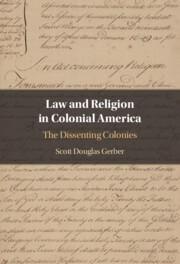Book contents
- Law and Religion in Colonial America
- Also by Scott Douglas Gerber
- Law and Religion in Colonial America
- Copyright page
- Dedication
- Epigraph
- Contents
- Tables
- Acknowledgments
- A Note on Methodology
- Introduction English Law about Religious Toleration Prior to the Planting of Colonial America
- 1 Law and Catholicism in Colonial Maryland
- 2 Law and the Lively Experiment in Colonial Rhode Island
- 3 Law and the Holy Experiment in Colonial Pennsylvania
- 4 Law and Congregationalism in Colonial Connecticut
- 5 Law and a City Upon a Hill in Colonial Massachusetts
- Conclusion Law, Religion, and Historiography in Colonial America
- Works Cited
- Table of Laws
- Index
5 - Law and a City Upon a Hill in Colonial Massachusetts
Published online by Cambridge University Press: 19 October 2023
- Law and Religion in Colonial America
- Also by Scott Douglas Gerber
- Law and Religion in Colonial America
- Copyright page
- Dedication
- Epigraph
- Contents
- Tables
- Acknowledgments
- A Note on Methodology
- Introduction English Law about Religious Toleration Prior to the Planting of Colonial America
- 1 Law and Catholicism in Colonial Maryland
- 2 Law and the Lively Experiment in Colonial Rhode Island
- 3 Law and the Holy Experiment in Colonial Pennsylvania
- 4 Law and Congregationalism in Colonial Connecticut
- 5 Law and a City Upon a Hill in Colonial Massachusetts
- Conclusion Law, Religion, and Historiography in Colonial America
- Works Cited
- Table of Laws
- Index
Summary
The first part of this chapter explores the Pilgrims of Plymouth Colony’s conception of law on matters of religion. For the Pilgrims, law was both the memorialization of their commitment to the Word of God and an instrument for sustaining a sanctified society. The second part of the chapter details how the legislature and the courts of Massachusetts Bay Colony enacted many statutes and issued scores of judicial decisions to help ensure the success of their Puritan “Citty vpon a Hill.” In 1691 Massachusetts Bay was issued a new charter as a royal colony. The 1691 provincial charter required that “liberty of Conscience” be allowed “in the Worshipp of God to all Christians (Except Papists).” The third part of the chapter focuses on the laws enacted and adjudicated during the provincial period to determine whether Massachusetts Bay complied with the new charter’s requirement about religious toleration. Massachusetts Bay’s Puritan Standing Order—the unofficial alliance between Congregational ministers and godly magistrates—would not abandon the animating principle of Puritan Congregationalism without a fight, and that fight was waged in large part through statutes and court cases. It was not until 1833 that Massachusetts disestablished church and state.
Keywords
- Type
- Chapter
- Information
- Law and Religion in Colonial AmericaThe Dissenting Colonies, pp. 179 - 266Publisher: Cambridge University PressPrint publication year: 2023

